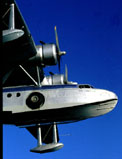 Grassroots
Grassroots 
 Grassroots
Grassroots 
Right now, my office is dark. And haunted The near-midnight black outside has flowed through the glass doors behind my computer, doing its best to smother the green glow of the words as they take form on the computer screen. But it can't.
All the darkness does is play games with the shadows around me, the shadows that flow from the artifacts which fill the room. Each of them contains the thoughts and adventures of men long gone. Each of them talks to me on a night like this.
For reasons entirely unknown, some nights are better suited to exploring the in-side of my mind than others. Those are the nights that the words flow onto the electronic paper to be turned into a sometimes monthly column. Often times, those are the nights the office is crowded. Haunted. A direct result of living in a minimum of space with a maximum of items from another time. Each with a story. Some with their own minds.
During the day, the room appears crowded. Jammed with stuff, things, bits of this and that. The room is a jumbled, chaotic, but most of all personal, collection of things that mean something to me. Things that meant something to others before me. Most of all, the room is a physical representation of me. A third dimensional Rorscbach blot with all my mental characteristics laid out for all to see.
The faded white fabric and the number NR2Y stares down from its wooden frame. The brush strokes that form the letters are uneven, almost amateurish. Bennie Howard could fly, but he couldn't paint numbers worth a damn. When he labored with a narrow brush to outline the gold letters in black, he shook slightly, the moving line wavering and uneven. When finished painting the numbers, he took the little Pete racer out and raised hell on the pylons, writing history and making money at the same time. Although Pete's ashes had long since been scattered, Benny's little airplane reached inside and touched me. Somehow its image caught my teenage mind unaware and set me on a course of interest that has never died. The Pete has taken form in the montage of welds, formers, and fittings that now occupy the center of my shop. -
An airshow poster from Broken Bow, Oklahoma, circa 1938, proclaims "Sensatianal, Thrilling . . . Stunt Flying',' and a small, black and white picture crammed into all the type shows Nr2Y on Pete's tail at a long-forgotten airshow. The nail holes in the corners of the poster show where, for ten cents a day, a young Okie ran all over town nailing them to poles, buildings and anything that would stand long enough. I don't know his name, but chances are he wore bib coveralls. Today, he'd be in his mid-8Os. Did his brief brush with aviation take hold? Or did he remain in the real world, avoiding the surrealistic emotionalism that separates aviators from the rest? Did he trade his dreams for security or did he follow them? Today, does he regret his decision?
A frail, far-away voice comes from behind the computer printer. A worn frame with stained matting stands on end, making the numbers NR869E hard to read. But the voice tells the story. A Lockheed Vega on its way around the world crashes in Siberia. The only piece to return home was the scrap of thin plywood bearing the number. Once famous, the voice seems to know that many in the world have forgotten his exploits. The signature on the thin piece of plywood says "Jimmy Mattern" and below that it reads "Bottoms up - Russia." I work with record-setting pilot Mattern's spirit crowding the room, fighting for space among the junk, the artifacts, and the other ghosts. It's a confusing room.
Two shelves lining the walls are jammed. The spaces between the shelves are covered. There is no empty wall space. The desk is hidden. The room is totally covered with physical connections to some place, some time that has left its mark.
A frame of fluted Clovis points beg the question as to how they were lost. Was it in hunting a wolly mammoth? Or maybe there was an accident. The hunter fell. His last thoughts compressed in a single step by the prey. The hunter was gone, the hunted survived. But the Clovis point remains to tell its tale. The thousands of years protected it with dirt and grass until a modern hand picked it up. The two human touches are separated only by time, the first a Neandertal, the last, thinking himself superior, is only a 20th century version of the first. We just hunt with Sidewinders and Harpoons, rather than Clovis and Folsoms.
On nights like this, my brother talks to me. Often. Hard to believe it's been nearly five years since the phone rang in the middle of the night and I got the word. His beat-up Stetson sits on top the computer. His silly, crooked grin ever-present. His presence felt. Sometimes, I'll reach up and put that hat on, seeking the connection. Wishing he wasn't gone. Sometimes just wishing. Sometimes sharing a tear with him.
A K-14A gunsight lives out its retirement holding an unruly bunch of books in order. Now a bookend, a lifetime ago it was bolted on the glareshield of a Mustang with young eyes squinting through the combining glass. At what? Was this gunsight practicing? Or was it the real thing? Did it serve its tour of duty on an Ohio training field, or were the tracers it was directing seeking a converging point marked by a swastika on a fleeting form? It talks to me. But I can't hear the words, only the emotions. I can't hear the history, only the thoughts of the young airmen who sat in front of it comes through. They were seeking to be their best. to become one with the machine and, in so doing, become a finely honed weapon of retaliation.
Old words are all around me. Some of them are funneled through a very early RCA transceiver. As I listen to the pilot trying his new-fangled communication device, I can hear someone in the background talking about this new politician, Roosevelt, and whether he'll win and what he thinks he can do about the Depression. Was it a dark night, like this one, and was the pilot desperate to locate a lighted beacon on the horizon to confirm his position? Or was there fog between him and safe haven, and he was hoping those on the ground could hear his engine and tell him if he was where his compass and pocket watch said he should be? Did he wear a parachute? Did he make it home to his wife and family that day? Talk to me radio! Let me know where you've been. What you've said and what you've heard. Stop mumbling.
I love nights like this. I love to sit in the middle of the room feeling so many people, so much history around me. I wish I could respond to them, letting them know of their continuity, that their deaths didn't mark the end of their existence. That part of their lives has lived on in this small room with the glowing screen in the corner. I wish I could let them know they are appreciated, and explain the near reverence in which their artifacts are held.
As we pass through life, we each generate our own tide of artifacts, personal and otherwise. With luck, they are passed on, and with them a little of our history goes with them. The saddest life is one that leaves nothing behind for the next generation to savor. In my case, the leave-behinds include dozens of hand-made chisels, each of which has created ornaments and weapons, things proud and things silly. It includes my own piece of fabric with Nl6PS on it. It includes a couple of Martin guitars that sang their way through many a dark, smoky room and filled a lot of dark nights. It also includes thousands of words. They, too, have been both silly and proud.
With luck, part of me will eventually wind up on someone's shelf. If so, that would be my grandest achievement. When that happens, I promise, on special dark nights I'll talk to him. I'll tell him stories of those I've known. Those I've loved. The places I've been and the places I was headed. I'll give him the history that makes the artifact whole and puts it into context. I only hope his heart is open enough to listen. I'll keep talking, nonetheless. BD